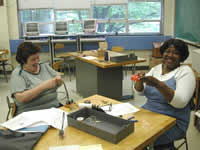|
How We
Use the Web:
II. Interactive Educational Experiences
Experiences from Serendip
- It's hard to find the wherewithal for having experiences
in libraries, textbooks, magazines, and the like. One consequence
is that classrooms tend to make one kind of learning
(the kind where one reads/hears/is shown) seem like the
only or at least the only important kind. Good teachers
can try and offset this in their own classrooms but it takes
substantial investment in planning and materials that needs
to be done and redone individually in each case.
 The
web is not only an information resource, it is also an experience
resource. Because the web is computer based, one can
create not only information resources but also experiences,
things that people can play with and learn from on their
own and/or learn from by watching other people play with
them. The
web is not only an information resource, it is also an experience
resource. Because the web is computer based, one can
create not only information resources but also experiences,
things that people can play with and learn from on their
own and/or learn from by watching other people play with
them.
- Discovering this web potential and becoming familiar with
its use encourages substantial rethinking of classroom
practices to encourage/support more hands on, student centered
learning, whether it is done using the web or in other
ways.
Commentary on Serendip's Experiences
The web has the potential to substantially contribute to
a broader recognition of the importance of "multiple
intelligences" in education, and to a transition from
a more directive and narrowly focused educational environment
to one that has a broader base and is more exploratory/playful.
Serendip's Pedagogical Musings
Conceiving of educational environments as a place to
have "experiences" rather than a place to convey information/
perspectives/ skills is a significant step for many teachers.
It means to some extent abandoning a desired predictability
in what will occur in classrooms and raises interesting
questions about content-coverage as well as assessment. These
are, however, issues that probably deserve serious consideration
in any case, and so the availability of web "experiences"
highlights important educational issues rather than creating
them de novo.
Web "experiences" are somewhat more difficult to create
than are web-based information resources but need not be greatly
so. The educational potential is, in any case, large enough
to warrant teachers developing increased sophistication in
generating such materials. Like information resources, they
can be created in ways that make them usable by wide audiences
so the time investment can be readily justified.
|